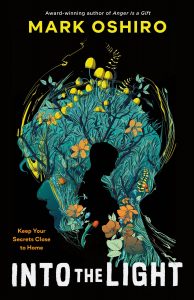The Year in Review 2023 by Colleen Mondor
 2023 in Review by Colleen Mondor
2023 in Review by Colleen Mondor
There is a bit of a haunted story in my paternal family history that has preoccupied me since my father first shared hints of it when I was a teenager. We were talking about his father, my Pepere, who was born in Quebec and emigrated at the age of 13, with his family, to Rhode Island. I heard a few brief anecdotes over the years about their life in Canada and asked my father one day if he ever went north and visited their hometown. He was struck by the question – I remember the surprised look on his face. ‘‘It’s gone,’’ he told me, ‘‘there’s nothing to see there.’’ And because that made no sense to me, he quickly explained, ‘‘They flooded it. The company flooded it and it’s all gone, underwater. It’s under a lake.’’ And that was that.
Fifteen years ago I came across Drawn & Quarterly’s English release of Pascal Blanchet’s graphic novel White Rapids. The story of a small village built in northern Quebec to house the workers of a new powerplant and what later happened to it, caught my eye because the company involved was Shawinigan Water & Power, and Shawinigan was directly associated with the destruction of my grandfather’s village of Saint-Ignace-du-Lac. I learned a little more about the company from Blanchet’s book (which is lovely), but my father was dead nearlya decade when I discovered it, and so I could not share it with him. As for my grandfather, he never wanted to talk about his childhood; he turned a page on his past and gave me only the briefest of answers when I asked about his home.
 All this is to say that when I read the premise for Quinn Connor’s Cicadas Sing on Summer Graves, I was immediately captivated. Set in Prosper, Arkansas, the story follows three protagonists who are each grappling with personal issues of destiny and decision while also feeling their way through life in a sleepy lakeside town. Everything in Prosper is complicated by the lake, which is the driving source of the tourism economy but also covers up an ugly history: The town of Old Prosper was flooded when the dam failed in 1937 and stands, still, beneath the water. How that flood happened, who directed it, and what remains is the stuff of legend. It is also creepy as hell and draws in the three women who anchor the plot.
All this is to say that when I read the premise for Quinn Connor’s Cicadas Sing on Summer Graves, I was immediately captivated. Set in Prosper, Arkansas, the story follows three protagonists who are each grappling with personal issues of destiny and decision while also feeling their way through life in a sleepy lakeside town. Everything in Prosper is complicated by the lake, which is the driving source of the tourism economy but also covers up an ugly history: The town of Old Prosper was flooded when the dam failed in 1937 and stands, still, beneath the water. How that flood happened, who directed it, and what remains is the stuff of legend. It is also creepy as hell and draws in the three women who anchor the plot.
The mysterious, uncertain, occasionally bizarre atmosphere of Lake Prosper drips off every page of Cicadas Sing on Summer Graves and while the main characters alternately embrace and resist the pull of the lake (and whatever is below it), it is that atmosphere that grabbed me from the first page. Plenty of things happen in the novel, but it’s the heavy air of a Southern summer that commands the reader to consider the horrifying aspects of what might happen. There have to be ghosts in the lake and honestly, who can blame them for lingering there? A whole town is underwater, inspired, according to an author’s note, by the actual flooding of Buckville, Arkansas in the 1950s. It seems unlikely, but I know how powerful a hold such a thing can have on a place, a population, or an entire genealogy. I loved how the characters found their way to Prosper’s secrets and their own in this novel and how beautifully those secrets were revealed. If you want something different, Cicadas Sing on Summer Graves should be your choice.
I did not expect to read two speculative novels set in Arkansas last year, but The Wonder State by Sara Flannery Murphy, set in Eternal Springs, sent me right back into the Ozarks. Told in two timelines, Murphy’s novel follows a group of high school seniors tracking down eight mysterious houses built decades earlier by a reclusive maverick architect. The houses are not just intriguingly designed, however, they are also magic. In one house you must tell the truth, another slows down time, another is lucky, etc. For various reasons, they are all intent on finding the eighth house, which might provide a door into another dimension. One of the friends desperately needs that door to give her an escape, but for a lot of reasons familiar to anyone who ever went to high school, the group squabbles and struggles and before the house is found, there is a murder that sends everyone in varying directions of denial and distance. They all graduate and leave Eternal Springs except Brandi, and 15 years later it is a message from Brandi that brings them all back, to find her, and also, finally, the eighth house.
 There are some obvious influences here, starting with the band of friends from Stephen King’s IT, but also hints of Meddling Kids by Edgar Cantero and, honestly, anyone who ever went home to a high school reunion with unfinished business in mind. I loved the premise of the houses and the architect, all the relatable issues of romance, class, and power in the teenage relationships and the lingering messiness from those issues that is present when the group came together again. I also, again, loved the setting and how it impacted the logistics of the story; the effort to uncover what a small town hides and investigate how it has managed to seem so benign for so long. There is an element of ‘‘kid detectives all grown up’’ in The Wonder State, which is fun, but also the underlying challenges of trust and love and safety that permeate so many of the friendships we develop when we are young, and how fragile they can be, and how foolhardy. For all that some of the houses are truly frightening, The Wonder State is a subtle book that compels the reader with its exploration of quiet malevolence and how seductive power, any degree of power, can be.
There are some obvious influences here, starting with the band of friends from Stephen King’s IT, but also hints of Meddling Kids by Edgar Cantero and, honestly, anyone who ever went home to a high school reunion with unfinished business in mind. I loved the premise of the houses and the architect, all the relatable issues of romance, class, and power in the teenage relationships and the lingering messiness from those issues that is present when the group came together again. I also, again, loved the setting and how it impacted the logistics of the story; the effort to uncover what a small town hides and investigate how it has managed to seem so benign for so long. There is an element of ‘‘kid detectives all grown up’’ in The Wonder State, which is fun, but also the underlying challenges of trust and love and safety that permeate so many of the friendships we develop when we are young, and how fragile they can be, and how foolhardy. For all that some of the houses are truly frightening, The Wonder State is a subtle book that compels the reader with its exploration of quiet malevolence and how seductive power, any degree of power, can be.
Switching gears (or heading west), Where Echoes Die by Courtney Gould is set in Arizona and it caught me with an old-fashioned science fiction premise (still so damn rare for teen fiction) about a former military town where something has gone seriously awry. Teens Beck and Riley are grieving the death of their mother, an investigative journalist who spent her final years obsessed by the town of Backravel, Arizona. Led by a cryptic note she left behind, Beck insists on driving through Backravel on their way to live with their father in Texas. But nothing in the small town is as they expect and Beck, driven by a desire to believe her mother’s final story was something worth dying for, cannot leave until she gets to the bottom of what is going on with the ‘‘treatments’’ that most of the town is receiving at a nearby medical center run by the town’s founder. Then Riley gets sick and it’s too late to run away, and both girls have to hope their mother was on to something real and they can find the answers that eluded her.
There were lots of things about Where Echoes Die that appealed to me, from the town’s veneer of superficial perfection like Madeleine L’Engle’s Camazotz, to Beck’s feet-on-the-ground investigating (which she learned from her mother), her fledging romance with local Avery, and even how the girls’ father is not some indistinct figure but an increasingly paranoid parent who soon suspects they are not being honest with him and shows up just in the nick of time. There’s some humor in the novel as well and a lot of ‘‘you have to be kidding me’’ moments that both teens share. At its heart though, Where Echoes Die is an old-fashioned mystery that revels in classic moments of danger and discovery. It’s the best kind of page-turner and an excellent recommendation for readers who enjoy smart protagonists who take chances to get to the truth.
Into the Light by Mark Oshiro was tricky at first, as the nonlinear narrative shifts back and forth in the life of the protagonist while also sometimes dipping into the life of another character who is related in some way to the protagonist but how is completely unclear. (Stay with me on this, I swear the book is totally worth any early questioning and actually quite an impressive feat of plot structure.) Manny is the main character, Eli is the secondary, and what they know (or don’t) about each other is intense and harrowing and part and parcel of the book’s major twist. Their relationship is the heart of what I thought at first was realist teen fiction, then considered might have been speculative, and came to believe was outright horror. What made me return to Into the Light so much over the past few months was how Oshiro kept me going with the realism angle for so very long, and how even after I turned the last page, and knew it was horror, I couldn’t deny how true to life it seemed. Oshiro has written a Master Class of white savior complex/religious corruption nightmares with this novel, and is definitely an author whose work I hope to return to again and again.
 First, there is Manny, who has been on his own for a year after being kicked out by his adoptive family who practiced a strict fundamentalist religion under the sway of a charismatic leader. His sister stayed with the group, and he is determined to someday rescue her in a manner that sounds a lot like a cult deprogramming. After hearing a news story about the discovery of a body near where he believes the group’s camp to be located in Idyllwild, California, he is desperate to find out if it’s Elena. Hitching a ride with a family on their own complicated mission, they set out to find the camp. But Manny doesn’t realize what Eli is going through, or how his fears of upcoming secretive coming-of-age/repentance ritual are part of Manny’s own past with the church. As one teen participates in a conventional, if somewhat intense road trip, and the other steels himself for an experience that has, possibly, killed others in the past, both must confront their own feelings about family, faith, and broken trust. I’m not going to lie – the twist at the end came totally out of left field for me and took a little while to process. It’s a spectacular finish to a thoughtful novel that commands a great deal of attention from its readers. I loved it.
First, there is Manny, who has been on his own for a year after being kicked out by his adoptive family who practiced a strict fundamentalist religion under the sway of a charismatic leader. His sister stayed with the group, and he is determined to someday rescue her in a manner that sounds a lot like a cult deprogramming. After hearing a news story about the discovery of a body near where he believes the group’s camp to be located in Idyllwild, California, he is desperate to find out if it’s Elena. Hitching a ride with a family on their own complicated mission, they set out to find the camp. But Manny doesn’t realize what Eli is going through, or how his fears of upcoming secretive coming-of-age/repentance ritual are part of Manny’s own past with the church. As one teen participates in a conventional, if somewhat intense road trip, and the other steels himself for an experience that has, possibly, killed others in the past, both must confront their own feelings about family, faith, and broken trust. I’m not going to lie – the twist at the end came totally out of left field for me and took a little while to process. It’s a spectacular finish to a thoughtful novel that commands a great deal of attention from its readers. I loved it.
Who Haunts You by Mark Wheaton is about the complicated nature of hauntings with a protagonist who challenges both herself and everyone around her. Rebecca (‘‘Bex’’) has autism and because of her past struggles controlling impulsive, sometimes violent, behavior, she presents as a classic unreliable narrator. It also doesn’t help that she is one of the few who believes the recent spate of accidental deaths among her high school classmates are actually murders. Wheaton keeps the thriller-like plot humming as Bex and a fellow student attempt to find proof of their suspicions, which point in the direction of a murderous ghost, but when Bex becomes a target, her anxieties are soon overwhelming (which is easy to understand since someone or something is trying to kill her). She spins out of control, and readers must consider that perhaps all of this has been in her head. Except… well, except there are all those suggestive clues dangling out there, and so Bex keeps looking and, well, you have to read it to see what happens.
Wheaton, who acknowledges his own experience with neurodiversity in a brief afterword, has created a first-rate protagonist in the sarcastic, suspicious, and determined Bex. Her host of therapist-recommended coping mechanisms have served her well in living with autism, but the stress of the murders is more than anyone should be expected to endure. (The blithe manner in which the adults dismiss the deaths as the result of the school’s competitive nature and the capriciousness of youth is perhaps the most galling aspect of the plot.) The author takes the book further than one might expect, right upto Bex’s psychiatric commitment, and seeing her hang in there until the bitter end, and never give up, is fantastic. Who Haunts You flew way under the radar last year; I hope more folks seek it out.
What else did I love in 2023? There was all the gothic drama of Ava Reid’s A Study in Drowning, where two students find themselves chasing a Possession-like mystery; the delightful wit of Emily Wilde’s Encyclopedia of Faeries by Heather Fawcett, which calls to mind Amelia Peabody’s archeological antics (be sure to check out the equally appealing sequel, Emily Wilde’s Map of the Otherlands); the continued adventures of England’s magical booksellers in Garth Nix’s Sinister Booksellers of Bath (how I adore this series!) and the tension-filled sibling relationship of Lily Meade’s The Shadow Sister. (What would you do if you hated your sister, then she went missing, and then she came back and you were the only one who noticed she was not… right?) I was so happy to find unique and wonderful books last year and share them with Locus readers. I hope you all had an equally enjoyable bookish twelve months as I did, and that 2024 gifts us with more to rave about!
This review and more like it in the February 2024 issue of Locus.
 While you are here, please take a moment to support Locus with a one-time or recurring donation. We rely on reader donations to keep the magazine and site going, and would like to keep the site paywall free, but WE NEED YOUR FINANCIAL SUPPORT to continue quality coverage of the science fiction and fantasy field.
While you are here, please take a moment to support Locus with a one-time or recurring donation. We rely on reader donations to keep the magazine and site going, and would like to keep the site paywall free, but WE NEED YOUR FINANCIAL SUPPORT to continue quality coverage of the science fiction and fantasy field.
©Locus Magazine. Copyrighted material may not be republished without permission of LSFF.







